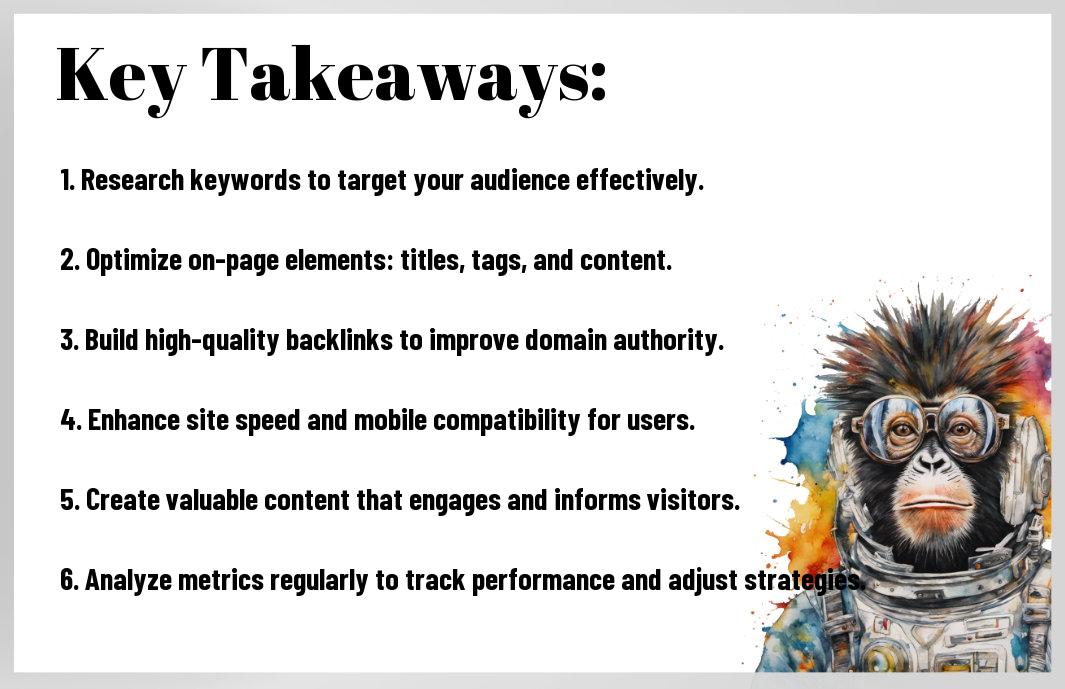Many aspiring affiliate marketers overlook the importance of search engine optimization (SEO) in driving traffic to their sites. In my experience, understanding the fundamentals of SEO is crucial for boosting your visibility and making successful affiliate sales. From keyword research to on-page optimization, each element plays a significant role in how your content ranks in search engines. By applying these SEO basics effectively, you can enhance your reach, attract the right audience, and ultimately increase your commissions.


Understanding SEO and Affiliate Marketing
To succeed in affiliate marketing, I believe it’s crucial to have a firm grasp of Search Engine Optimization (SEO). Combining these two fields not only helps you drive more traffic to your affiliate links but also enhances your overall online presence. SEO involves optimizing your content, website structure, and backlink strategy to improve your rankings on search engine results pages (SERPs). This directly correlates to your ability to attract potential customers who are in search of products or services that you are promoting as an affiliate.
The Relationship Between SEO and Affiliate Marketing
Above all, the relationship between SEO and affiliate marketing lies in how well you can leverage optimization strategies to gain visibility and credibility. As an affiliate marketer, your primary goal is to generate traffic that leads to conversions. By employing effective SEO techniques, you can increase the chances of your content being discovered by search engines, which will ultimately drive more organic traffic to your affiliate offers. Therefore, understanding keywords, meta tags, and on-page SEO elements becomes paramount in ensuring your success in this competitive landscape.
Importance of SEO for Affiliate Success
For anyone venturing into affiliate marketing, acknowledging the importance of SEO can set you apart from the competition. Quality SEO can help establish your authority in your niche, encouraging more visitors to trust your recommendations and leading to higher conversion rates. When you optimize your content effectively, you improve user experience and boost your rankings with search engines, which can result in ongoing traffic—that’s key for affiliate success.
Understanding the significance of SEO in affiliate marketing can’t be overstated. The more optimized your site is for search engines, the more likely it is that your audience will find your affiliate links. As you attract organic traffic, you open the door to potential customers who are genuinely interested in the products you endorse. Therefore, a solid SEO strategy not only enhances your visibility but can also generate long-term, sustainable income from your affiliate marketing endeavors.
Keyword Research Essentials
Any successful affiliate marketing strategy begins with a solid understanding of your target audience, particularly what they are searching for online. Conducting effective keyword research allows you to tap into the phrases and terms that potential customers use, guiding your content creation in a way that attracts organic traffic. In essence, identifying the right keywords not only enhances your visibility in search engines but also aligns your content more closely with the needs and interests of your audience. This alignment is necessary for conversion and ultimately, affiliate success.
Identifying Target Keywords
Keywords are the fundamental elements that dictate how well your content performs in search engine results. To identify your target keywords, I often start by brainstorming topics that relate to my niche. Consider what problems your audience may have and the solutions they seek. Look into long-tail keywords, which are phrases that typically consist of three or more words, as they often have less competition and can lead to higher conversion rates. Tools like Google autocomplete or AnswerThePublic can spark ideas and help you visualize what people are actively searching for.
Tools for Effective Keyword Research
Around the world of SEO, various tools exist to simplify the process of keyword research. I particularly favor platforms such as Google Keyword Planner and SEMrush, as they provide insights into search volume, competition, and related keywords. Using these tools allows you to gauge the popularity of specific keywords, enabling you to prioritize those that can drive the most traffic to your site. It’s also vital to monitor trends and seasonal changes to adapt your strategy accordingly.
Another option that I find helpful is using free tools like Ubersuggest or Moz’s Keyword Explorer, which offer valuable data without the need for a paid subscription. Each tool has its advantages, so I recommend experimenting to understand which aligns best with your goals. Keep an eye on metrics such as search volume, keyword difficulty, and search intent to ensure that your chosen keywords not only attract visitors but also resonate with your affiliate marketing objectives.

On-Page SEO Strategies
After entering into the foundational elements of SEO, I realized that on-page SEO strategies are crucial for boosting my affiliate marketing efforts. These strategies not only help search engines understand my website better but also enhance the overall user experience. I found that optimizing content for keywords and paying attention to meta tags can lead to significant improvements in my site’s visibility. If you want to know How To Elevate Your SEO Affiliate Marketing Game, focusing on these aspects will serve as a solid starting point.
Optimizing Content for Keywords
With a solid keyword strategy, I noticed remarkable changes in my site traffic. I began by conducting thorough keyword research to identify relevant terms that my target audience frequently searches for. Each piece of content on my site was tailored to naturally incorporate these keywords without compromising the flow or quality of the writing. As I continued optimizing my content this way, my articles started to gain traction, driving more organic traffic to my affiliate offers.
Importance of Meta Tags and Descriptions
At first, I underestimated the impact of meta tags and descriptions, but soon learned their importance in attracting clicks from search engine results. Properly crafted meta tags not only serve to inform search engines about the page content but also entice users to click through to my website. By including targeted keywords and creating compelling descriptions, I’ve seen an increase in my website’s click-through rates, significantly contributing to my affiliate success.
Descriptions play a vital role in your site’s SEO by providing concise information about the content. They act as the first impression for users in search results and can make or break their decision to click. Crafting an engaging description not only highlights the main points of your page, but can also incorporate strategic keywords to enhance visibility. Moreover, if your descriptions are clear and appealing, you are more likely to experience higher click-through rates, which positively impacts your site’s overall performance. Be sure to focus on delivering crucial details, as a well-optimized meta description can guide potential customers straight to your affiliate offers.
Building Quality Backlinks
Unlike other SEO elements, backlinks hold a significant place in determining your site’s authority and credibility. They serve as a vote of confidence from one site to another, suggesting that your content is valuable and worth referencing. Consequently, having a strategy for obtaining quality backlinks can dramatically enhance your affiliate marketing efforts and boost your website’s visibility. It’s not just about the quantity of links, but rather their quality; authoritative sites linking to you can send positive signals to search engines, significantly improving your rankings.
What Are Backlinks?
Backlinks are simply links from one website to another. When a website links to your content, it tells search engines that your site has something valuable to offer. The more reputable the site that links to you, the more trust and authority you gain in the eyes of search engines. Essentially, backlinks serve as pathways for users to navigate from one site to another, guiding them towards quality content. Establishing a diverse backlink profile can help you widen your reach and ultimately increase your traffic, which is vital for affiliate success.
Strategies for Acquiring High-Quality Links
Strategies for acquiring high-quality links involve a mix of content creation, networking, and outreach techniques that cater to both your audience and authoritative websites in your niche. I find that creating valuable, well-researched, and engaging content is the first step. When others see the merit in what I’m offering, they are more likely to reference it in their own work. Additionally, engaging with industry influencers or participating in guest blogging can open up avenues for high-quality backlinks from reputable sources.
Considering the competitive nature of affiliate marketing, you should prioritize building relationships with other content creators. Engaging in authentic networking can lead to opportunities for collaboration and backlinking. Moreover, maintaining a presence on social media and participating in online communities related to your niche can draw attention to your content. You may also consider leveraging tools that help identify broken links on reputable websites; you can pitch your content as a replacement, providing mutual benefits. Ultimately, focusing on quality over quantity and being strategic in your approach will help foster a sustainable backlink profile that supports your affiliate marketing efforts.
Technical SEO Fundamentals
Many aspiring affiliate marketers overlook the importance of Technical SEO, which is a critical aspect that ensures your website is crawlable and indexable by search engines. This involves various components such as site architecture, URL structure, and metadata management. As you examine this arena, I want you to focus on creating a strong foundation that not only benefits your site’s visibility but also enhances user experience and engagement. If you can master these fundamentals, you position yourself for greater success in your affiliate endeavors.
Site Speed and Performance
Fundamentals of site speed and performance cannot be overstated. A website that loads quickly enhances user experience significantly, leading to lower bounce rates and higher engagement. I urge you to use tools like Google PageSpeed Insights and GTmetrix to analyze your site’s performance. Optimize images, leverage browser caching, and minimize HTTP requests to boost your load times. When done right, not only do you improve your rankings on search engines, but you also foster trust and reliability among your visitors.
Mobile Optimization
Among the myriad factors that contribute to your site’s performance, mobile optimization stands out as a vital component. With more users accessing content on mobile devices than ever before, having a mobile-friendly site is not an option but a necessity. I recommend implementing responsive design techniques to ensure that your site adapts seamlessly to different screen sizes. This approach not only enhances usability but also aligns with Google’s ranking algorithms that prioritize mobile-first indexing.
Further enhancing your mobile optimization efforts includes keeping navigation simple and touch-friendly. You should utilize larger buttons and readable font sizes, allowing users to interact with your content effortlessly. Additionally, be wary of intrusive pop-ups that can annoy mobile users and lead to higher bounce rates. By focusing on user experience on mobile devices, you not only cater to a larger audience but also signal to search engines that your site is valuable and user-centric, thereby positively impacting your search rankings.
Content Marketing for Affiliates
Keep in mind that effective content marketing is at the heart of successful affiliate marketing. It’s vital to not only engage your audience but also to drive traffic and increase conversions. I recommend exploring Affiliate Marketing SEO: 9 Techniques to Boost Rankings for insights that can help enhance your visibility. Crafting informative, entertaining, and relevant content will ensure your audience values and trusts what you offer, leading to better engagement and conversions in your affiliate marketing efforts.
Creating Value-Driven Content
Content plays a pivotal role in affiliate success, and I always focus on ensuring that what I publish provides real value to my audience. This could mean creating how-to guides, product reviews, or comparison articles that help my readers make informed decisions. By prioritizing value over promotional language, I create an environment where readers are more likely to act on my affiliate recommendations. Additionally, search engines reward sites that provide in-depth, useful content, which can further boost my visibility and traffic.
Promoting Affiliate Links Wisely
The way I promote affiliate links can significantly impact my success. It’s important to integrate them seamlessly within my content rather than bombarding my readers with blatant advertisements. Subtly placing affiliate links in relevant sections can capture attention without seeming overly salesy. I also prioritize transparency by disclosing my affiliate relationships, as this fosters trust and credibility with my audience and aligns with best practices in the affiliate marketing space.
At times, I find myself tempted to promote multiple affiliate links aggressively, but this can backfire. When promoting affiliate links, it’s vital to focus on the context in which I include them. Highlighting specific products or services that genuinely align with my content and audience’s interests can lead to higher conversion rates. Keeping the communication clear, concise, and honest not only promotes a healthy and positive relationship with your audience but also mitigates the risks of coming across as insincere or overly commercial.
Final Words
As a reminder, understanding the SEO basics is vital for achieving success in affiliate marketing. I have shared key principles, such as keyword research, on-page optimization, and the importance of creating quality content that resonates with your target audience. By incorporating these strategies into your marketing efforts, you can significantly enhance your online visibility and drive more traffic to your affiliate links.
Moreover, it’s important to stay updated on the ever-evolving landscape of SEO practices. I recommend continually educating yourself to adapt and refine your strategies accordingly. By focusing on user experience and implementing effective SEO techniques, you can build authority in your niche, nurture trust with your audience, and ultimately increase your affiliate revenue.
Click Here to Unlock Your Financial Freedom!
FAQ
Q: What is SEO and why is it important for affiliate marketing?
A: SEO, or Search Engine Optimization, refers to the practices used to enhance the visibility of a website in search engine results. For affiliate marketers, SEO is important as it drives organic traffic to their affiliate links. The higher a site ranks on search engines like Google, the more likely users will visit it. This means better odds of clicks on affiliate links, leading to increased potential earnings.
Q: What are the key components of on-page SEO for affiliate sites?
A: On-page SEO involves optimizing individual pages of a website to rank higher and earn more relevant traffic. Key components include using targeted keywords in titles, meta descriptions, headers, and throughout the content. Additionally, optimizing images with descriptive alt text, ensuring a responsive design for mobile users, and enhancing page loading speed play significant roles in improving user experience and search rankings. Providing valuable and relevant content can help build trust with visitors and encourage them to follow your affiliate links.
Q: How important is keyword research in SEO for affiliate marketing?
A: Keyword research is imperative in SEO as it identifies the terms and phrases potential customers use to search for products or services. By understanding what keywords resonate with your target audience, you can create focused content that meets their needs. Using the right keywords enhances the chances of appearing in search results, attracting relevant visitors to your affiliate site. Tools like Google Keyword Planner or SEMrush can help uncover high-traffic keywords that align with your niche, ultimately boosting affiliate opportunities.


